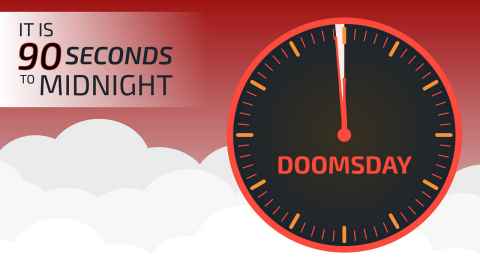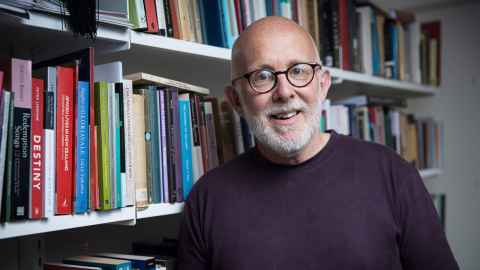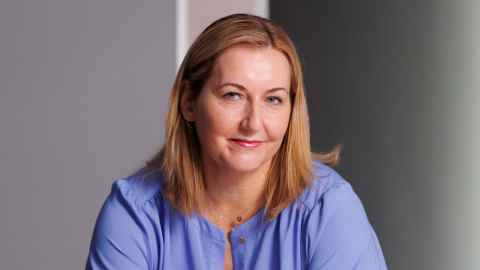Taking Issue: should we be worried about the Doomsday Clock?
24 May 2024
Opinion: The Doomsday Clock has become a metaphor for how close humanity is to self-destruction. Academics from the University of Auckland share their views on whether this ticking timepiece is anything to worry about.

Apocalypticism offers people hope. Most of us don’t subscribe to that specific brand of hope, but we probably need some other.

Nick Thompson: hope is vital to respond effectively
There’s a church in West Auckland that has its own doomsday clock. Under the digital time-display it flashes warnings of Jesus’s imminent return. At the church’s gate, a sign reads, ‘Watch the Middle East. God is’.
I often wonder whether the people issuing these warnings know of the thousands of confident but failed doomsday prophecies that litter two millennia of Christian history.
To be fair to this church, it’s far from the only group looking for some purpose or direction in the baffling chaos of events. By global measures, New Zealand is not a very religious country, but I suspect most of us think of our lives and times as though they had some kind of narrative arc.
For example, we might speak of the ‘right side of history’ as if future generations will see things our way. Or we might talk gravely of the ‘lessons of history’, assuming that we can agree on the meaning of the past. And even when we can agree, those imagined lessons may no longer apply because next time is never quite the same as last time.
No matter how carefully and expertly we gaze into the past or future, the horizons of our own time and space constrain our vision. The only doomsday we face with any certainty is our own death. We can’t be sure when that will come or that it will provide our individual story with a tidy and satisfying ending.
Apocalyptic movements reassure their members that the passage of time is more than ‘one damn thing after another’. For those of us who are not members, apocalypticism’s revenge fantasies, polarising rhetoric, coded language, and conspiracism may seem baffling and repellent.
But apocalypticism also offers people hope. Most of us don’t subscribe to that specific brand of hope, but we probably need some other. Without hope, it is hard to see how we respond effectively to a world that looks more unstable than it has for most of our lifetimes. In the absence of any other kind of hope, apocalypticism will seem increasingly attractive to those who have not already opted for cynicism or despair.
Dr Nick Thompson is a senior lecturer in Theological and Religious Studies.

The collaborative nature of space exploration also serves as a hopeful model for
addressing global challenges.
Catherine Qualtrough: the role of space exploration
In the expanse of the cosmos, humanity faces a critical moment reflected by the Doomsday Clock, currently set just minutes to midnight. This symbolises the growing existential threats confronting our planet.
From a space perspective, the concerns highlighted by the Doomsday Clock extend beyond terrestrial boundaries, encompassing potential cosmic threats such as asteroid impacts. While unlikely, these events could have catastrophic consequences, emphasising the need for vigilance and preparedness. However, the clock primarily reflects concerns about human-induced catastrophes, such as warfare and climate change.
Despite these challenges, space offers reasons for optimism. As a spacefaring species, humans increasingly have the capability to mitigate existential risks through technological advancements. For instance, ongoing research aims to develop technologies to potentially mitigate the threat of asteroid impacts on Earth, while hundreds of orbiting Earth observation satellites provide valuable data to monitor and understand our changing planet.
Climate change, a contributing factor in the current Doomsday Clock setting, underscores the importance of these efforts. From satellite-based climate monitoring to renewable energy solutions inspired by space exploration, space insights help address this challenge.
The collaborative nature of space exploration also serves as a hopeful model for addressing global challenges. Despite geopolitical tensions, nations have come together to pursue ambitious space missions, and initiatives such as the International Space Station exemplify how diverse nations can collaborate.
Nevertheless, it’s essential to acknowledge that space is not a panacea. While space exploration provides us with invaluable insights and tools to help safeguard our planet, we must also recognise that there is no backup planet for Earth. By continuing to explore and understand the cosmos while prioritising the preservation of our home planet, humanity can chart a course towards a sustainable future.
Catherine Qualtrough is a research operations manager in the Faculty of Science.
We should take a step back and ask exactly why extinction would be bad.
Tim Mulgan: confronting the threat of extinction
Suppose you knew the world would end 200 years from now. How would that affect your plans, your values, your life choices? It’s a tricky question for future philosophers and anyone – living in a world facing unavoidable imminent extinction – trying to make sense of their lives.
Popular debate asks how much we should pay now to reduce future risks of human extinction. This presupposes that extinction is always the worst result. This debate is important. But I think we should also take a step back and ask exactly why extinction would be bad. If humanity really did have only two centuries to live, what might those centuries be like? Would it matter now that the end is coming soon?
American philosopher Samuel Scheffler argues that “most of us would find the prospect of humanity’s imminent extinction unbearably depressing”. This reveals the importance, in our everyday lives, of the assumption ‘that others will continue to live after I have died’. We need future people whose culture, traditions, values and projects are connected to, and descended from, our own.
I agree that our present projects presume a human future. But is this an essential feature of the human condition, or merely a contingent feature of the particular traditions we have inherited?
Could we prepare our descendants to flourish at humanity’s end, even if we cannot imagine flourishing there ourselves? Could people living at the start of the slowly ending world initiate an intergenerational ethical transformation so that later generations can still find meaning without relying on (further) future people? If our inherited values will not make sense to future people, can we pass down values that will?
That’s a lot of questions, I know, which of course is the essence of philosophy.
We do not, so far as we know, live at the start of a slowly ending world. But we do inhabit a world facing an increasingly uncertain future. Perhaps we can better face our own challenges by imagining people confronting the starker threat of imminent extinction.
Tim Mulgan is a professor of philosophy in the Faculty of Arts. His new book is Philosophy for an Ending World (Oxford University Press).
Aversion to these doomful scenarios can stimulate hopeful futures.
Martin Joe: doom is not certain
At its core, the issues influencing Doomsday (nuclear risk, climate change, disruptive technologies and biosecurity) are all topics of grander realities that people should be worried about.
These issues have the potential to alter and shape much of how people experience their everyday lives – and for some issues, e.g. climate change, its impact is already felt.
For many, the days of worrying are gone. They are lived realities. These grand, global issues have real-world impacts. How then, do you address these issues? On a global scale, these issues are seemingly too massive in scale to be scaled, and too tall to be insurmountable for the everyday person. There is the possibility of these issues being seen as the natural state of the world. This is certainly compounded by the fatalistic symbolism of the clock being linear (even if it is conceptually able to be moved back) and compounded with clock superstitions of death. Doom is not certain. Aversion to these doomful scenarios can stimulate hopeful futures.
Hope is actionable. The grand issues that threaten humanity are not the only important threats to people’s lives and livelihoods. People’s everyday life is important. Addressing the smaller-scale, yet pertinent issues impacting people can help contribute towards long-term systemic shifts in how those grander issues are addressed.
Reinforcing people’s shared humanity in everyday life is crucial, especially when the interconnected world consistently produces anti-social and antagonistic news and messaging. Demonstrating empathy, kindness, care and respect reciprocally every day can elevate collective outcomes and help enhance people’s trust in each other. Constant worrying over unaddressed issues can lead to a sense of hopelessness. And people, in an increasingly individualistic and disproportionately divided world, cannot solve global issues alone.
It is natural to worry and to be overwhelmed with these existential threats. Directing this worry into actionable prosocial, compassionate and kind behaviours to the people around you is important. Doing so not only addresses people’s immediate concerns, but also lays the groundwork for more hopeful futures.
Doom is crucial in establishing the context for hope. While more significant efforts are required, these hopeful futures can be achieved - just as humanity has continuously achieved hopeful futures for millennia.
Martin Joe is a graduate teaching assistant in the School of Environment. He is doing his PhD on the concept of doom.
‘Doom’, ultimately related etymologically to ‘deem’, is the usual Old English word for law or judgement. It carries none of the modern connotations of disaster and destruction.
Keith Montgomery: It’s all about the word
Most people associate the word ‘Doomsday’ with the catastrophic end of the world. Little wonder though. Since 1947, with the advent of the atomic age, the Doomsday clock has ticked away in the media, ebbing and flowing to and from midnight when detonation of the ‘Doomsday machine’ (first used in 1960) would bring about the atomic destruction of the world.
More recently, the Doomsday clock has been realigned to unchecked climate change and the ecological destruction of the world. Either way, Doomsday = the end of life on earth at humanity’s own hands.
Over time, old words inevitably acquire new meanings by their association with a new concept. Doomsday is no different: it has moved from its religious domain to a secular one, but has also taken on a range of new emotive and frightening connotations.
‘Doom’, ultimately related etymologically to ‘deem’, is the usual Old English word for law or judgement. It carries none of the modern connotations of disaster and destruction.
Doomsday is first recorded in Anglo-Saxon biblical texts, and is a compound of dōm + es + dæġ which literally means ‘judgement + of + day’ = ‘judgement day’. While the Bible leaves no doubt that there will be destruction on judgement day, it is God not humanity who weighs up evidence to decide an individual’s fate. It matters not whether they are living or already dead. It is not even the end – they all go on to eternal life in one of two places, one quite pleasant and the other quite hot.
We can detect a slight connotation shift in Doomsday’s move from its religious use to the secular in the title, Doomsday Book. The book, compiled 1085-86, was simply a survey of each household throughout the land for tax purposes.
There are no actual penalties or judgements in it. In fact, it did not acquire the name Doomsday Book for around another 150 years. An early account of the title makes it clear that it is metaphorical and simply points to the fact that individual taxation can be judged and not escaped, neatly foretelling Benjamin Franklin’s ‘Nothing can be said to be certain, except death and taxes’.
The meaning shift of the word Doomsday and its connection with a clock counting down the end of humanity need not instil panic. We’ve been waiting since Anglo-Saxon times.
Dr Keith Montgomery is a senior lecturer in linguistics in the Faculty of Arts.

Selina Tusitala Marsh, Doomsday Clock 2024: a poem
Global catastrophes
man-made technologies
nuclear bombs
carbon emissions
A.I.
apocalyptic pathogens
But for indigenous peoples
90 seconds to midnight
is all day, all night
For those
who have lived and loved lands
warred and shored lands
of their ancestors
the Doomsday Clock
tick-tock, tick-tocked
yesterday
And if you fly high enough
above our beloved earth
above time and space
you’ll see a million dots
of gold
Wild flowers
Reaching through tarmac
fractures and gaps
in highways and by-ways
of new ways
Not old ways
You’ll see a million
wild daisies
stubborn in their yellow beauty
crowning in green tenacity
pushing through and on and up
rising and flowing
chained by hope
and knowledge of Not Alone
and wisdom of Here Is Home
a gold river running
through concrete cracks.
Kintsugi
the art of golden joinery
the art of golden repair
The time is now
is Here.
Poet and author Selina Tusitala Marsh is a professor of English and Drama in the Faculty of Arts.
The first three opinions appeared in the Autumn 2024 edition of Ingenio.
The writers’ views reflect personal opinions that may not be those of Waipapa Taumata Rau, University of Auckland.